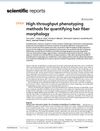 4 citations,
June 2021 in “Scientific Reports”
4 citations,
June 2021 in “Scientific Reports” Hair fiber shape and curvature are not significantly linked when ancestry is considered.
 August 2023 in “International journal of research in Ayurveda and pharmacy”
August 2023 in “International journal of research in Ayurveda and pharmacy” Garudan Kizhangu Ennai may effectively treat alopecia areata but needs more research to confirm its safety and effectiveness.
 November 2017 in “Elsevier eBooks”
November 2017 in “Elsevier eBooks” PCOS is a genetic disorder affecting women's reproductive health, with treatments focused on symptoms like insulin resistance and fertility.
 336 citations,
August 2015 in “European Journal of Epidemiology”
336 citations,
August 2015 in “European Journal of Epidemiology” The Rotterdam Study found risk factors for elderly diseases, links between lifestyle and genetics with health conditions, and aimed to explore new areas like DNA methylation and sensory input effects on brain function.
 247 citations,
August 2011 in “European Journal of Epidemiology”
247 citations,
August 2011 in “European Journal of Epidemiology” The Rotterdam Study updated its design and objectives in 2012, providing insights into various diseases in the elderly, including skin cancer, bone health, liver disease, neurological and psychiatric conditions, and respiratory issues.
 2 citations,
July 2022 in “Cell Regeneration”
2 citations,
July 2022 in “Cell Regeneration” Understanding hair growth involves complex factors, and more research is needed to improve treatments for hair loss conditions.
 April 2023 in “Medizinische Genetik”
April 2023 in “Medizinische Genetik” New gene discoveries have improved diagnosis and treatment for skin and hair disorders, but more research is needed to fully understand them.
10 citations,
September 2022 in “Animals” Certain genes affect udder shape in Holstein cows, important for health and milk production.
 June 2012 in “Faculty Opinions – Post-Publication Peer Review of the Biomedical Literature”
June 2012 in “Faculty Opinions – Post-Publication Peer Review of the Biomedical Literature” Six new risk spots for early hair loss were found, which also link to Parkinson's disease and lower fertility. Two genes, FOXA2 and HDAC4, could be new treatment targets. Hair loss might also be connected to heart disease, metabolic syndrome, and prostate cancer.
 1 citations,
May 2023 in “Frontiers in Endocrinology”
1 citations,
May 2023 in “Frontiers in Endocrinology” Autism's genetics are linked with early age of puberty and less hair loss, but not with hormone levels or polycystic ovary syndrome.
 October 2012 in “Faculty Opinions – Post-Publication Peer Review of the Biomedical Literature”
October 2012 in “Faculty Opinions – Post-Publication Peer Review of the Biomedical Literature” Six new genes linked to early hair loss were found, which also surprisingly connect to Parkinson's disease and lower fertility.
 October 2012 in “Faculty Opinions – Post-Publication Peer Review of the Biomedical Literature”
October 2012 in “Faculty Opinions – Post-Publication Peer Review of the Biomedical Literature” Six new genes linked to early hair loss were found, which also surprisingly connect to Parkinson's disease and lower fertility.
1 citations,
August 2021 in “Medical Science Monitor” Male and female hair loss have different genetic causes.
 April 2024 in “Frontiers in microbiology”
April 2024 in “Frontiers in microbiology” Certain gut bacteria may increase or decrease the risk of male pattern baldness.
January 2015 in “Hair transplant forum international” Female pattern hair loss is different from male pattern hair loss and has unclear genetic causes.
9 citations,
May 2019 in “Medicine” The C-allele and CC-genotype in the PTPN22 gene lower the risk of alopecia areata.
40 citations,
June 2021 in “Clinical, cosmetic and investigational dermatology” JAK inhibitors show promise in effectively treating hair loss from alopecia areata.
 5 citations,
November 2022 in “Animal Genetics”
5 citations,
November 2022 in “Animal Genetics” Genomic research can help improve the quality and production of natural fibers in animals.
 1 citations,
June 2023 in “Genes”
1 citations,
June 2023 in “Genes” Hair loss from Alopecia Areata is caused by both genes and environment, with several treatments available but challenges in cost and relapse remain.
Alopecia Areata causes hair loss and needs treatments that address both physical and emotional health.
 June 2024 in “Computational and Structural Biotechnology Journal”
June 2024 in “Computational and Structural Biotechnology Journal” Multi-omics techniques help understand the molecular causes of androgenetic alopecia.
May 2023 in “Pharmaceuticals” Three specific mutations in the LIPH gene can cause hair loss by damaging the protein's structure and function.
 December 2022 in “IntechOpen eBooks”
December 2022 in “IntechOpen eBooks” Forensic DNA Phenotyping accurately predicts physical traits and is used in investigations, but needs more diverse population data for confirmation.
 January 2022 in “IntechOpen eBooks”
January 2022 in “IntechOpen eBooks” Some lesser-known causes of PCOS include autoimmune issues, genetic mutations, and changes in the body's microbiome.
94 citations,
April 2018 in “Nature Genetics” New genetic locations explain much of hair color variation in Europeans.
 29 citations,
January 2021 in “Translational Psychiatry”
29 citations,
January 2021 in “Translational Psychiatry” The research suggests that Tourette syndrome is linked to both brain signaling and immune system pathways.
 12 citations,
February 2021 in “Translational Psychiatry”
12 citations,
February 2021 in “Translational Psychiatry” Researchers found two new genetic variants linked to Alzheimer's disease.
 28 citations,
July 2017 in “Journal of Endocrinological Investigation”
28 citations,
July 2017 in “Journal of Endocrinological Investigation” Early onset baldness in men may indicate a condition similar to PCOS, linked to heart disease, diabetes, and prostate issues.
 4 citations,
November 2017 in “Scientific Reports”
4 citations,
November 2017 in “Scientific Reports” The research provides a gene-based framework for hair biology, highlighting the Hippo pathway's importance and suggesting links between hair disorders, cancer pathways, and the immune system.
 25 citations,
July 2013 in “Journal of Dermatological Science”
25 citations,
July 2013 in “Journal of Dermatological Science” Six new hair loss factors in men not linked to female hair loss.






















